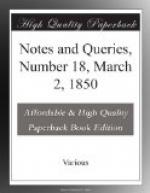“Dans le ll’me siecle les proces se faisaient aux vassaux par leurs Pairs, c’est-a-dire, par leurs convassaux, et toute sorte de proces se font encore presentement en Angleterre a toutes sortes d’accuses par leurs Pairs, c’est-a-dire, par des personnes de leur meme etat et de leur meme condition, a la reserve des Bourreaux et des Bouchers, qui, a cause de leur cruaute ne sont point juges. Geoffroi Martel, Comte d’Anjou, fit faire ainsi le proces a Guerin de Craon, qu’il avait fait foi et hommage de la Baronnie de Craon a Conan, duc de Bretange. Geoffroi fit assembler ses Barons, qui, selon l’ancienne forme observee en matiere feodale, firent le proces a Guerin, son vassal, et le condamnerent, quoiqu’il fut absent.—Et il est a remarquer a ce propos, que le Pape Innocent III., qui favourisait Jean sans-Terre, parcequ’en 1213 il avait soumis son royaume d’Angleterre au Saint Siege au devoir de mille marcs d’argent par an, ayant allegue aus Ambassadeurs de Philippe Auguste que Jean sans-Terre avait ete condamme absent, et que les loix defendent de condamner les accuses sans les ouir; ils lui respondirent que l’usage du Royaume de France etait de condamner les absents, aussi bien que les presents, lorqu’ils avaient ete deuement cites en jugement. Chez les Romains il n’etait par permis de condamner les absents: Non licet civem inauditum damnare.”
Now, Sir, this passage shows “Martel,” as a name, like that of “sans-Terre,” bestowed for some quality or circumstances attached to the bearer;—and I should like to ask your correspondents if they know how this Comte d’Anjou, became entitled to it? He appears, from the date, to be the same Geoffrey who is the ancestor of our Plantagenets, as the Comte d’Anjou, contemporary with William the Conqueror, was named Fulk. If it can be proved that this Count received this addition from his martial prowess, I shall be strongly tempted to return to my creed regarding Charles Martel.
W. ROBSON.
* * * * *
QUERIES AS TO JUNIUS.
Amongst the letters attributed to Junius, and, in the opinion of Dr. Good, most certainly his production, is one signed “ATTICUS,” under date of the 19th Aug. 1768, which contains an allusion to the private affairs of the writer, by no means unimportant. It is as follows:—
“The greatest part of my property having been invested in the funds, I could not help paying some attention to rumours or events by which my fortune might be affected: yet I never lay in wait to take advantage of a sudden fluctuation, much less would I make myself a bubble to bulls and bears, or a dupe to the pernicious arts practised in the Alley. I thought a prudent man, who had any thing to lose, and really meant to do the best for himself and his family, ought to consider the state of things at large, of the prospect before him, and the probability of public events.




